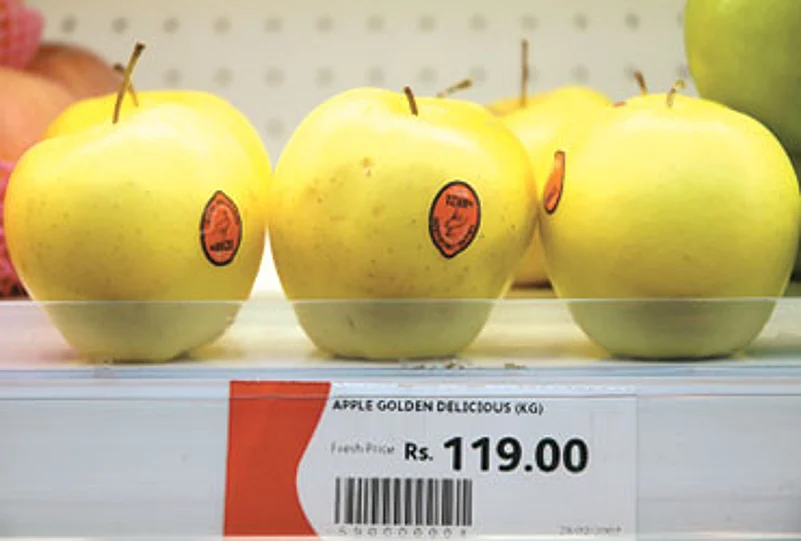- Like, California almonds for their property to reduce blood glucose levels
- US-grown pistachios slow down absorption of carbohydrates
- Soy acts as healthy protein source for vegetarians
- Chefs are roped in to make traditional dishes with imported food
- Critics say the drive is insidiously changing local food habits, and meant to only further exports to India
***

Apple imports from the US went up to 28 million kg in 2006-07 from 16 million kg in 2003-04. And, it isn't an onslaught of primary agri products alone.
And if one needed proof of how successful these groups have been, the figures say it all. In 2000, the import value of soy products from the US was just $60,000, but by end-2007 that figure, thanks to the promotion by the ASA, went up to $6 million. Similarly, apple imports from the US went up from 16 million kg in 2003-04 to 28 million kg in 2006-07 and grapes rose from 6.1 million kg in 2004-05 to 8.3 million kg in 2006-07. Import of almonds from California in '07 reached 33 million kg, a 35 per cent rise over '06.
It isn't just an onslaught of primary agricultural produce. Even products like oats are competing with indigenous alternatives such as dalia. Saran feels these products have come in because of the right market conditions. "First, there's a growth in the media sector—that's making people aware about such products and their benefits. Second, Indian families increasingly have the cash required to purchase them. And finally, the retail market here is developing rapidly, supporting such initiatives," he says.
While the US has pioneered this trend of pushing their products, they are by no means alone. Besides US entities, SCS also represents the Turkish Hazelnut Promotion Group and the International Olive Council. Even countries like France and Australia are looking at snatching a share of this lucrative market through their boards like Sopexa and Austrade respectively.
The influx of these goods comes at a time when some of the native varieties of fruits and vegetables are becoming scarce. This is something that worries food writer Nilanjana S. Roy, chief editor at Westland publications. "As a consumer and a glutton, I'm delighted we have access to a wider variety of products, but I worry when I see local fruits like jamun, mulberries and phalsa being squeezed out," she says. And given the aggressive campaigning by the boards about the health benefits their products bring, Roy adds, consumers need to be more cautious today at the supermarkets. "If you have to choose between California grapes and a samosa, pick the former. But if it's between Indian grapes in season and grapes from California, pick the Indian ones. They're likely to have spent less time in cold storage, and should be better for you."
Some like Parshuram Ray, director of the Delhi-based Centre for Environment and Food Security, in fact argue that these groups are "part of a package that has undermined indigenous food habits and self-reliance". But Saran refutes such charges: "I'd say it is not a shift in the diet but an expansion. All what I'd advise is eat healthy. Eat Indian if available. If not, don't wait for it."
Kamala Krishnaswamy, a former director of the Hyderabad-based National Institute of Nutrition, argues that such a "confused market" is an inevitable fallout of globalisation. "It's certain that nuts are better sources of healthy N3 fatty acids and that prunes are healthier than sugar-rich processed foods, but that doesn't mean we switch over totally. Take them in small proportions, diversify your diet. That's the best alternative," she says.
Lax quarantine and import regulations have also made it easier for foreign produce to come in. Notes S. Dave, director of India's Agricultural and Processed Food Products Export Development Authority: "While it took India close to two decades to gain access to markets in the US and Japan because of extremely stringent import requirements, these groups have flooded our markets in just a few years." He doesn't moot a ban on imports, but feels India must have stringent quality checks on food and food products that come into the country. Now, that is nobody's point of dispute.


























